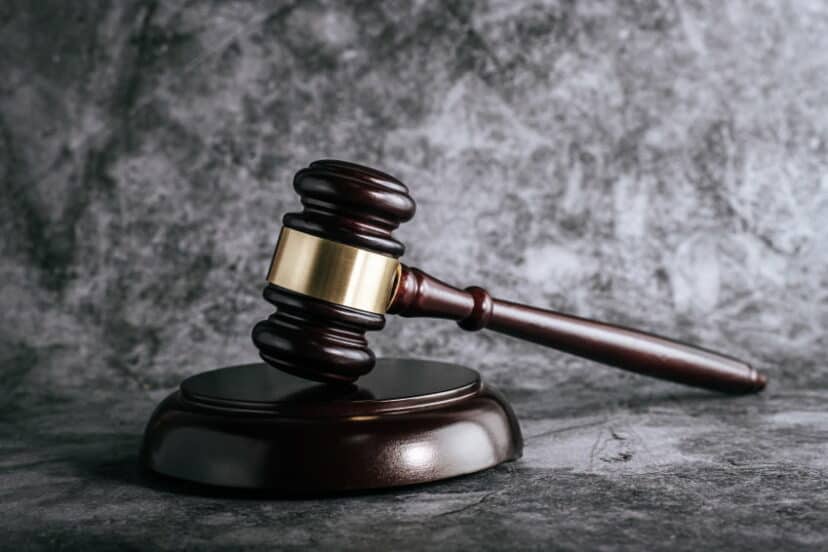How To Defend Yourself Against A Narcissist In Court (15 Tips)
*We may earn a commission for purchases made using our links. Please see our disclosure to learn more.
When you become the enemy of a narcissist, they don’t just want to win, they want to crush you. You are posing a threat to them, and that’s a challenge to their superiority. They have to utterly defeat you in order to maintain that grandiose delusion. When you end up in court with a narcissist, it’s very important that you take the appropriate steps to defend yourself. They will come at you in an extremely aggressive way.
To win against a narcissist in court, there are several things you need to do. The narcissist is a savvy manipulator, and they can convince people of their version. You’ll need to document everything, only contact them through lawyers, provide witnesses, and be well-prepared with evidence.
The narcissist can put on a good show for a little while, so you need to respond with everything you’ve got. It’s important to be prepared for the kinds of things they will throw at you. To prevail, you’ll need to do several different things. Let’s take a look at just what you can do so that you can defend yourself successfully in court and afterward.
1. Create a Paper Trail
One of the most important things you can do when you’re being abused by a narcissist is to create a contemporaneous paper trail of events. If the narcissist is physically abusive, get a restraining order. You should also take a picture of any physical injuries you sustain at the hands of the narcissist.
It’s also helpful to keep a journal of your interactions, what was said or done, and your interpretation of the events. Talk to your friends too. While it might be embarrassing, they can act as witnesses on your behalf to attest to the fact that you told them what was going on at the time.
Court cases often come down to your word against the narcissist’s word, so the more evidence you have in the form of contemporaneous accounts, people you talked to about the abuse, and notes you kept, the better you will fare in court.
It may not be easy to document the abuse you’re going through, but it makes a substantial difference in the courtroom. Your observations, notes, any restraining orders, physical evidence, and the conversations you had with friends at the time are all important pieces of evidence that will help you prevail in court.
2. Talk with a Therapist

To go up against a narcissist in court, you’re going to have to get your head in the right place. A therapist can help you understand the emotional abuse and how it’s affecting you. They can also be a witness on your behalf in the courtroom.
They can provide that all-important contemporaneous documentation that helps prove your side of the story. They can also help you use more effective coping strategies to both confront your narcissistic abuser and stay calm while you go through this process.
It will be vital for you to stay calm. The narcissist will project their chaotic inner world onto you and claim you are the one who’s got a problem. The more calm, cool, and collected you can stay, the more the judge or jury will believe your account of the situation.
Additionally, if you can stay calm and collected, it will likely trigger your narcissistic adversary. That will be evident in their body language, actions, and testimony if they take the stand. The calmer you are, the more they are likely to look like an abusive, crazy person.
3. Document Every Interaction
As you go into this process, be sure to document every interaction, every conversation, and every decision you make along the way. Contemporaneous notes are able to be used as evidence, but you also want to make sure you are noting everything you have said or done with the narcissist.
Narcissists will try to engage you to avoid a confrontation in court. By documenting their attempts to contact you as well as anything they say or do, it can help you get a restraining order if that is necessary, and it is evidence that can be used against them.
If possible, you want to make sure you have witnesses to your interactions with them. Let them know that you asked your witness to be present. That will minimize the likelihood of an aggressive confrontation, and if it doesn’t stop them, you’ll have a witness who can testify in court.
Your witness can also act as emotional support for you too. They can help you stay strong as you must go through this process. It’s a helpful strategy for several different reasons.
4. Consult Legal Professionals

It is imperative that you don’t try to go through any legal proceeding involving a narcissist without legal professionals on your side. You may think you have a clearcut case and can defend yourself with them, but the truth is that you’re much more likely to lose in court without a trained legal professional on your side.
Legal professionals know the court system, and they can get the things you need, like a restraining order, much more efficiently than you can alone. There are a number of legal considerations that you may not be aware of, and these vary state by state and country by country. That’s why you need legal professionals to help you.
Legal professionals are the only people you should be discussing your case with, and you should not be in contact with the narcissist without a legal professional present. These are people who will be on your side, and they can provide objective, knowledgeable guidance every step of the way.
I can’t emphasize enough how important it is to have legal representation when you are going through a court proceeding with anyone, but especially with a narcissist. Don’t try to do it on your own, or you may come to regret that decision. Even if the narcissist seems to be acting reasonably, when things get tough – and they will – you need a lawyer on your side.
5. Get Witness Statements
Anyone who has witnessed an incident between you and the narcissist should be on your witness list. You want to get as many witness statements as you can about the narcissist’s abusive behavior.
The more people who have witnessed the narcissist’s behavior and can testify to what they saw, the stronger your case will be. The narcissist will hit you with everything they’ve got to try to utterly destroy you. That’s why you have to be prepared to do the same.
Witnesses can add weight to your account of what happened between you and the narcissist. You might not want to ask them or involve them, but it’s vital to get their statements if they are a witness on your behalf.
Your lawyers can get formal statements and depose them before the trial. That also gives the opposition the opportunity to ask questions as well. Your legal professionals can help to prepare them for this process so that they will know what to expect.
6. Get Character Statements on Your Behalf

Character statements are different from witness statements. These are statements about your character from friends and family who attest to your good character. You’ll need these because the narcissist will likely try to disparage your character.
They will try to paint you as the one with mental health problems. They will also project their bad qualities onto you. They will say you are the liar, the gaslighter, and the abusive person. If you have both witnesses to the contrary and people who can attest to your good character, the judge or jury will be less likely to believe the narcissist.
It’s vital to remember that the narcissist no longer sees you as a friend, a lover, or someone they trust. They will, therefore, try to make you out to be a villain. Remember, they will want to crush you. They don’t just want to win their case, they want you to be utterly destroyed. This is the vindictive nature of narcissism.
If you’re not prepared for that, you’ll be shocked, and it will be much more difficult to win your case. Get as many character statements as you can to show you are not what the narcissist will say you are.
7. Have Your Attorney Get Subpoenas
A subpoena is a court order that requires a person to appear in person. This is a way to reach out to people so that they will show up to testify on your behalf.
Additionally, an individual who receives a subpoena will usually receive an attendance fee for doing so. They can also get their transportation to and from court reimbursed so that you don’t have to worry about them being inconvenienced by having to appear.
It also gives them a valid excuse so they cannot be penalized for missing work or school. Subpoenas from allies often supply very convincing proof for your case, and they can play a significant role in convincing a judge to rule for a legal outcome in your favor.
8. Arrive at Court Early

The day of your court case will be a very stressful time for you. Arriving at court early will help to alleviate anxiety, and it will give you time to compose yourself. It gives you time to take a few deep breaths before the action starts.
The narcissist will do everything possible to make you seem like an erratic, volatile individual, but if you come prepared and keep your cool, their efforts will be in vain. There’s no doubt this will be a stressful event for you, but by arriving early and giving yourself time to relax, you’ll reduce your level of anxiety.
This time before the case actually starts will also give your attorneys time to go over any last-minute details with you. They can help you to calm down and reassure you during this time. You’ll also know that you won’t be late. You have enough to worry about without having to be concerned with being punctual.
9. Stay Away from the Narcissist and Close to Your Advocates
Do not, under any circumstances, communicate with the narcissist without your legal advocates being present. The narcissist may try to get you to talk to them and resolve this between the two of you, but you should not agree to that.
Remember that any communication you have with the narcissist without witnesses and your advocates being present can be skewed to make it appear that you have done something inappropriate. Don’t give them that opportunity.
Stay away from the narcissist and stick close to your advocates. They are the ones who have your best interests at heart. The narcissist has already shown you their true colors. If you want to get an outcome in your favor, stay away from them.
10. Always Stay Calm

I can’t stress this enough. It is imperative that you remain calm at all times. If you testify, the narcissist’s lawyers will have an opportunity to cross-examine you. You need to stay calm or they will make you look like you’re the volatile one.
It’s also important to stay calm in the courtroom even if you’re not on the stand. The judge or jury will be watching you, and they’ll be taking your reactions into account. When it comes time for them to determine who is telling the truth, your body language, attitude, and even your facial expressions will be factored into their judgment.
It’s vital that you stay calm because that conveys a message that you are certain of your account. You’re not frightened you will lose because you are telling the truth. If you lose your temper or show in your body language that you are doubtful, the jury or judge will pick up on that.
Stay calm, keep your facial expressions appropriate and neutral, and don’t make inappropriate or exaggerated body movements. Avoid smiling, joking, or other inappropriate emotional expressions. You want the judge and jury to know you’re taking the proceedings seriously. You want to be seen as the calm, honest person you are.
11. Talk to the Judge, Not the Narcissist
You will disagree with many things the narcissist says during the court proceedings. The narcissist will lie, and you might want to call them out for that. But when you’re in court, you are not to address your adversary directly. Don’t argue with the narcissist.
As the legal professionals at ADZ Law note, “Narcissists love to argue and get you to acknowledge that they are right. You will never win an argument with a narcissist. Fighting will only give them fuel for their claims that you are emotionally unstable.”
You want to talk to the judge or have your lawyers object on your behalf. You or your lawyers will have the opportunity to provide your side of the story. If you get emotional and start accusing the narcissist of being a liar, you’re only bolstering their case.
Your objective is to stay calm, state your case as the absolute truth, and allow your legal advocates to do their job. Don’t call out the narcissist, don’t talk to the narcissist, and don’t react emotionally to what they say in court.
They are going to lie. You can’t avoid that, but you can control your reactions and composure. Stay calm and cool, and the judge and jury will find you to be the more believable person in the courtroom. If you are given an opportunity to speak, be sure to address the court, not the narcissist. Talk to your lawyers, the narcissist’s lawyer, or the judge or jury. Do not address your comments to the narcissist.
12. Stick to the Court Orders

Always obey the court orders, and stick to what the judge rules. It happens time and again that a court will rule on your behalf. They will order the narcissist to stay away from you or pay you compensation, but the winning side becomes sympathetic toward the person they defeated, and they don’t follow what the court orders.
This will not work out well for you if you do that with a narcissist. They will take advantage of you once again. If the court rules in your favor, just stick to what they say. After the outcome, don’t see or speak to the narcissist about the court orders.
If you have to see them – for example, if you share custody of your children – then always have a witness and stick to whatever the court rules on that matter. If you make an exception even once, the narcissist will see that as weakness and proceed to take advantage of you time and again.
Don’t let them convince you to do anything differently, always have a witness to any necessary interactions, and if you are in doubt, contact your lawyers to ask them for clarification. Don’t try to solve any disagreements between yourself and your narcissistic abuser on your own.
13. Limit or Avoid Contact Following the Outcome
If you can, you should not have any contact with the narcissist following your court outcome. They will turn on the charm and try to win you back into their life. This is not what you really want, and it won’t work out for you.
They will abuse you again. Unless they have received extensive psychotherapy in which they are still involved, you can be assured they have not changed. No matter what they say, don’t have contact with them.
If you have to have contact with them for reasons beyond your control, have a witness with you, and try to arrange to be in contact with them in a public place. That will minimize their abusive tendencies and provide you with many witnesses should there be an aggressive confrontation.
No contact is best, but limited contact with witnesses is the alternative if you must maintain some contact. If you do share children with them, you might also consider having the court appoint an advocate for the children.
The advocate is called a guardian ad litem, and they can help prevent any abuse toward your children. This is particularly helpful if the children are experiencing abuse from the narcissist as well.
14. Contact Your Attorney if the Narcissist Fails to Obey

Narcissists frequently push the limit on what they can and can’t do. They often disobey orders from authority figures, including a judge. If this happens, contact your attorney or the police immediately.
You want to make sure you document any violations of court orders through official means. Your attorney can advise on how to go about doing this, but you should not overlook any violations. One minor violation can quickly turn into routine major violations when a narcissist is involved.
No matter how slight the violation is, contact your attorney and ask them how you should proceed to document it. It may seem like you’re being overly protective here, but the reality is that when it comes to a narcissist, you can’t give an inch. They will definitely take a mile if you do.
15. Always Have Witnesses to Any Future Interactions
Any future interactions you must have with the narcissist for any reason should always include a witness. You want to make sure you have someone who can testify to what happened should the narcissist try to pull anything.
Narcissists frequently flout authority and push the limit on what they’re allowed to do. They believe themselves to be above the law because they are special and superior to other people. They feel that rules don’t apply to them.
That’s why you should have witnesses so that they can verify what occurred. If the narcissist shows up unexpectedly, call a friend or ask a neighbor to join you. Walk outside so that your neighbors or other people can see what is happening.
Don’t just let it go, because even if they act appropriately on this one occasion., you can be sure they will be back, and so will their bad behavior.
Final Thoughts
If you’re going up against a narcissist in court, they will use every trick in the book to get you to lose your cool. They want you to look like the maniac who caused the problems in your relationship. They want to undermine your credibility. They will often use what they know are your emotional triggers to get a rise out of you. You can’t let those tactics work.
My 5 Step Roadmap to Heal Emotional Triggers can help you recognize, defuse, and heal those emotional triggers so no one can use them against you. This is a valuable tool to help you stay calm, cool, and collected in the face of narcissistic abuse. The added benefit is that the calmer you are, the more enraged the narcissist will become. To get a free copy of this handy guide, just click on this link, and I’ll send it directly to your inbox.
--
If you want more tips for dealing with narcissists, setting boundaries, and managing emotional triggers, make sure you subscribe to my youtube channel




